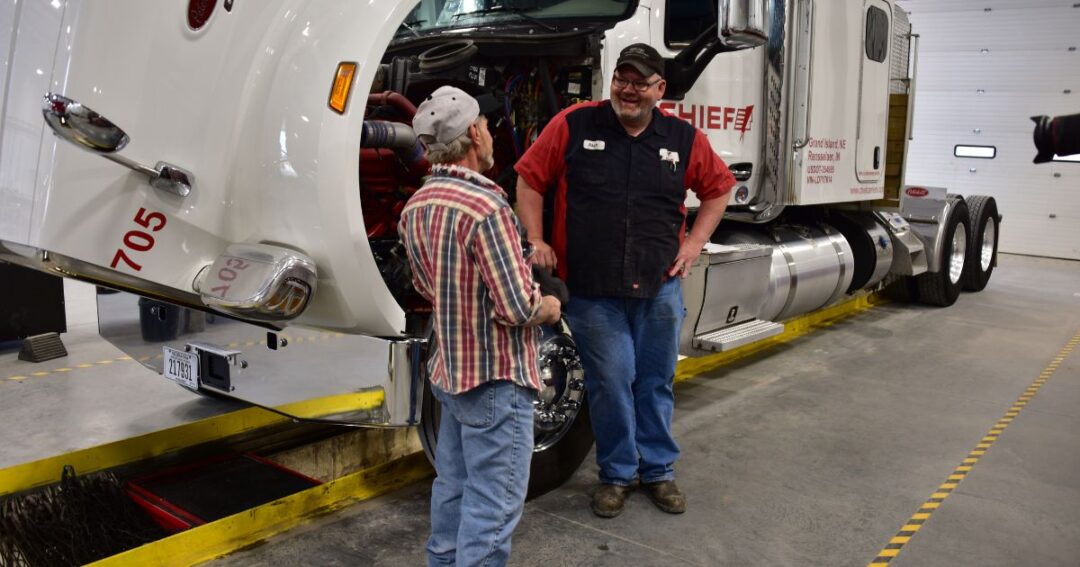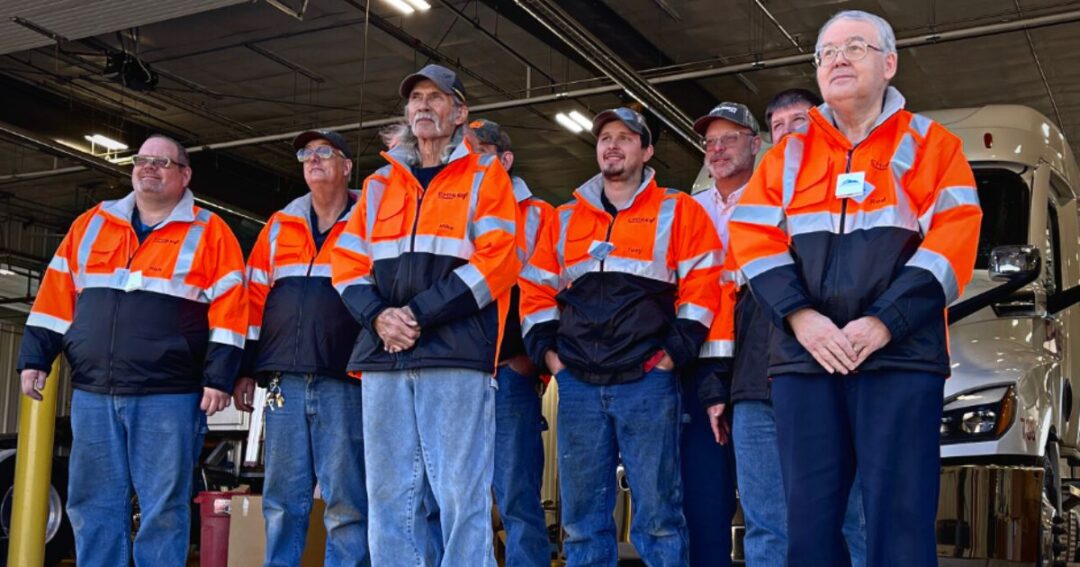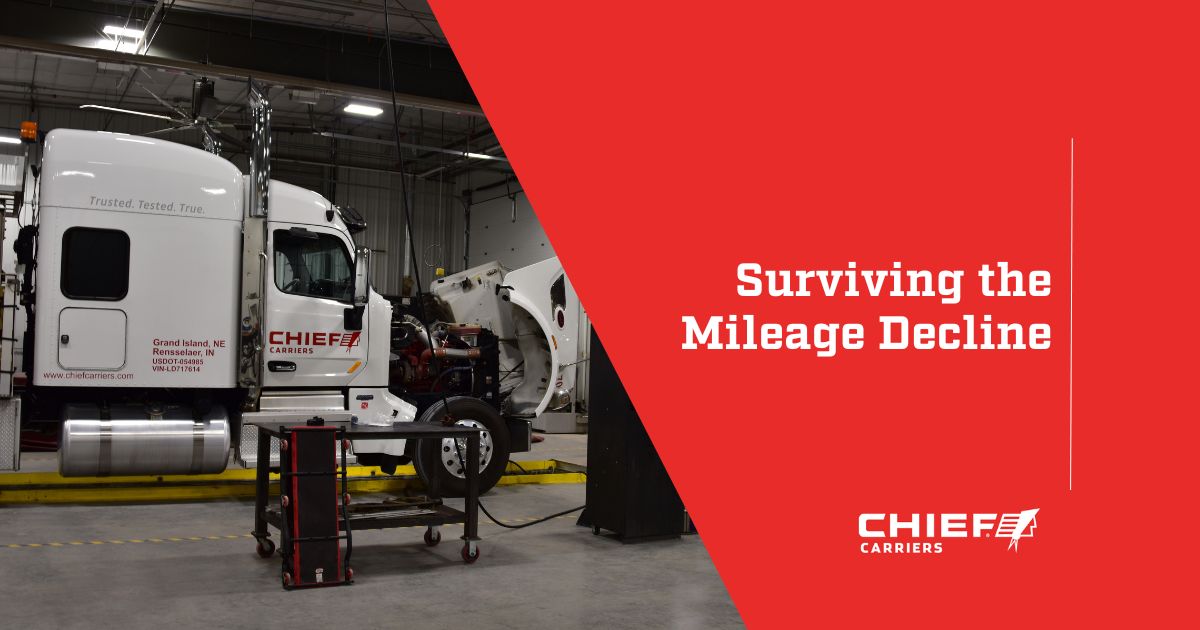Surviving the Mileage Decline
In our latest episode, we tackled a pressing issue that’s hitting close to home for many of us: the nationwide decline in mileage. It’s a topic that’s not just a fleeting concern but a persistent reality, affecting our livelihoods and reshaping our daily lives.
This decline isn’t just a number on a spreadsheet; it’s a shift that has profound implications, particularly during economic downturns that tighten our belts and test our resolve.
This blog is more than just words on a screen; it’s a lifeline of sorts. We’re here to offer practical advice, share additional insights, and perhaps provide a new perspective on surviving these tough times. Whether you’re a fresh face in this industry or a seasoned pro, there’s something here for everyone.
So, as we steer into this discussion, I pose this question: In an industry where the rubber always meets the road, how do we keep rolling when the miles start to dwindle? Let’s explore this together.
Evaluating Career Moves
When the road ahead looks uncertain, the crossroads of staying with your current career or seeking new opportunities looms large. It’s a decision that weighs heavily on many truckers’ minds. Staying put might offer stability and familiarity, but the grass always seems greener on the other side.
Yet, switching carriers isn’t a guaranteed path to more miles or better pay, especially in an industry currently throttled by economic headwinds.
Recruiters play a significant role in this landscape. Their job is to bring in drivers, and they’re good at painting an attractive picture of life at their company. But it’s crucial to remember that their promises are often more about allure than reality.
During these times of mileage decline, their assurances of plentiful miles and lucrative pay may not align with the actual state of the industry. They’re in the business of recruitment, after all, not fortune-telling.
The key lies in discerning fact from embellishment. It’s about understanding that while change can be good, it’s not without risks. The decision to jump ship in hopes of better opportunities should be measured against the reality of the industry’s current state. It’s essential to approach such choices with a blend of optimism and realism, a balancing act that’s all too familiar in the life of a trucker.
Risks of Switching Carriers
Jumping to a new carrier is like navigating a road filled with unseen potholes. The most immediate risk is financial – the gap between leaving your current job and the first paycheck from the new one.
This transition period can stretch your wallet thin, especially if there’s a delay in starting your new role or if the pay cycle at the new company doesn’t align with your financial needs.
For truckers living paycheck to paycheck, which is not uncommon in our industry, this gap can be a real strain.
Then there’s the issue of benefits and vacation policies. Starting anew often means resetting your accrued benefits. You might be leaving behind well-earned vacation time, only to start at square one with a new company that may have a less generous policy.
And let’s not forget about health benefits and insurance – there’s often a waiting period before these kick in at a new job. This gap in coverage can be more than just an inconvenience; it’s a gamble with your health and wellbeing.
Switching carriers is not just about chasing better pay or more miles. It’s a decision that impacts your financial stability and professional trajectory. It’s crucial to weigh these risks against the potential rewards, understanding that every new opportunity comes with its own set of challenges and uncertainties.

Staying with Your Current Carrier
Staying with your current carrier, like sticking to a familiar route, has its benefits. There’s comfort in the known: relationships you’ve built, understanding your dispatcher’s quirks, and knowing exactly where the best and worst rest stops are.
These relationships, especially with your dispatcher, can be gold in tough times. They know your preferences, your reliability, and they’re more likely to go the extra mile for you when miles are scarce.
To make the most of staying put, communication is key. Keep your dispatcher informed about your willingness to be flexible with loads or routes, something particularly valuable when freight is slow.
This openness can lead to more opportunities, maybe not the ideal routes, but enough to keep the wheels turning. Also, be proactive in seeking additional responsibilities or roles within the company, such as mentoring new drivers or participating in safety programs. These roles not only add variety to your work but also strengthen your position and visibility within the company.
Remember, staying with your current carrier isn’t about resigning to fate; it’s about strategically making the best of your situation. It’s about leveraging the known for stability while continuously looking for ways to grow and adapt. In an industry where change is the only constant, sometimes the smartest move is to stay in the lane you know best.

Job Hopping in Trucking
In the trucking industry, your work history speaks volumes, and frequent job changes can raise red flags. It’s a pattern that suggests instability and a lack of commitment, which can be off-putting to potential employers.
Carriers often view a driver’s work history as a reliability indicator, and a resume dotted with short stints can lead to missed opportunities. Job hopping might offer immediate relief or a quick pay bump, but it can jeopardize long-term career prospects.
To maintain a stable work history, it’s crucial to approach job changes with careful consideration. Before jumping to a new opportunity, weigh the pros and cons. Think about the long-term impact on your career. Are you moving for the right reasons, or is it a knee-jerk reaction to temporary dissatisfaction?
Building tenure at a company not only shows commitment but also allows you to develop deeper relationships and a stronger understanding of the business, which are invaluable in advancing your career.
If you find yourself contemplating a change, try addressing your concerns with your current employer first. Sometimes, issues can be resolved with a simple conversation, leading to improved conditions without the need for a drastic move.
Remember, a stable work history is a valuable asset in trucking, reflecting your dependability and commitment to the road.
Tactical Advice for Tough Times
Navigating tough economic times requires a combination of resilience and adaptability, both on and off the road. For personal and family finances, the first step is to reassess your budget. Identify areas where you can cut back without significantly impacting your quality of life.
This might mean reevaluating subscription services, dining out less, or postponing large purchases. It’s also wise to build or reinforce an emergency fund, no matter how small, to cushion against unexpected expenses.
On the road, flexibility is your best ally. Be open to taking loads or routes you might usually avoid. While they may not be your preferred choice, they can keep you moving and earning. Diversifying the types of loads you’re willing to haul can also open up new opportunities.
For instance, if you typically avoid short hauls, consider adding them to your repertoire to fill in gaps between longer trips.
Additionally, use any downtime to enhance your skills or knowledge. Whether it’s understanding more about truck maintenance or exploring new technology in the industry, staying informed and capable can make you more valuable to your employer.
Remember, adaptability isn’t just about surviving the present; it’s about positioning yourself for success when the industry bounces back.

Final Thoughts on Mileage Declin Mileage Decline
In this journey, we’ve navigated the challenging terrain of mileage decline and its implications for truck drivers. We’ve weighed the pros and cons of switching carriers versus staying put, highlighting the importance of stability and known relationships.
We’ve explored the pitfalls of frequent job changes and the value of a consistent work history. And we’ve shared tactical advice on managing personal finances and staying adaptable with load types and routes during tough economic times.
Remember, flexibility and strategic thinking are key.
Keep your hands steady on the wheel, your eyes open to new opportunities, and your heart resilient to the ever-changing roads of the trucking world. Stay safe, stay informed, and keep on trucking.
For a more in-depth exploration of these topics and to hear more stories from the road, I invite you to listen to the full episode of “Driven Too Far: The Truth About Trucking.” You can find it on our website, as well as on Spotify, Apple Podcasts, and YouTube. Each episode is designed to give you the insights and advice you need to navigate the trucking industry’s challenges.
Andrew Winkler
Andrew Winkler is the only executive in the trucking industry willing to get in the cab and listen to you. He started out in the driver’s seat like you–loving a life on the road, missing a family at home, and yelling at dispatch over the phone. He knows how it feels to be driven too far, which is why he’s giving you the truth about trucking so you can have both your family and your career.
Interested in having Andrew Winkler appear as a guest on your show? Have a show topic idea? Want to appear as a guest on Driven Too Far? Have a question?

